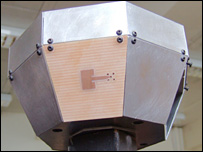RFID on every passenger at the airport
Avi Blizovsky

Electric badges to be worn by passengers at airports may help in the fight against terrorism. say scientists. A technological prototype is to be used in a trial at an airport in Hungary, and if successful it may become a reality at all airports within two years. The research is carried out by a new research institute at University College London that was established with the aim of developing technological solutions against crimes. Other projects in this field conducted by the research institute include, among others, a scan to detect explosives and a scan to detect radiation from "dirty bombs".
Dr. Paul Brennan, an electrical engineer, is the head of the labeling project known as Optag. According to him, "The basic idea is that an airport may be seeded in a network of systems that combine panoramic cameras and RFID readers, which can track the movement of people throughout the various buildings of the terminal. The plan, he said, is to provide each passenger with such a badge when check-in begins. "In our system, we will be able to locate each person with an accuracy of one meter and the camera and tag data can be combined to provide us with a powerful detective capability.
individual freedoms
The tags do not carry any data, but emit a signal that includes a unique identity number whose owner can be located through a search in the passenger identification system. In the future, Dr. Brannan said, the system could also incorporate biometric information.
The project still requires overcoming some hurdles such as finding a way to ensure that the tags cannot be swapped between different passengers or removed without notice. The fear of intrusion into individual rights may also be a factor that needs to be taken into account, but potentially, says Dr. Branan, the tags can add security by providing the possibility to monitor the movement patterns of the passengers and locate those who deviate from them as suspects, as well as prevent them from entering restricted areas. The system will also be able to help airports evacuate passengers in case of fire, quickly locate children and locate other passengers.
The proof of capability system will be tested at Debrecen Airport in Hungary. If successful, Brannan says, it will be available everywhere within two years.
The new center will also explore a wide range of additional security measures for airports. Prof. Robert Speller developed scanners for detecting explosives and drugs. The device can be used in airports as well as seaports and land border crossings. The scanner works by shooting x-rays at an object and examining how the photons - the particles of light - return. Different materials, he said, emit a unique pattern of photon scattering, and this can be used to detect whether a small amount of explosives or drugs are present in a suitcase. The scanners, he said, can be integrated into devices that are already used today to scan bags. In the meantime he developed a prototype - a Compton camera. This portable device can be used to examine whether dirty bombs were detonated in the area. He also checks if there is radiation in the place, and if so, the exact source. According to him, the system may help the rescue forces to identify dangerous areas and help in the decontamination operations.
The UCL Center for Security and Crime Science, which opened in London at the beginning of October, operates in many areas of science and investigates a number of topics in the field of crime and security. Prof. Gloria Laycock (Laycock), director of the center, says: "Security is a central concern in today's society, and it can come in many forms. Crime in the developed world is increasing, and there may be a connection between this increase and the increase in opportunities for crime. The most effective way to deal with the problem is to interrupt these opportunities. Science and technology can help us understand how to do this."
For news at the BBC
The biometrics expert
https://www.hayadan.org.il/BuildaGate4/general2/data_card.php?Cat=~~~608203114~~~143&SiteName=hayadan
